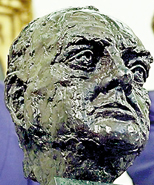Sunday Times 2
How the world took revenge on Germany
Hands up anybody who knows who conducted the largest ethnic cleansing on record, the forcible expulsions of some 15m people and deaths of at least 500,000. Stalin? Hitler? Mao? It was none of the above, but the victorious allies following the Second World War. This is one of the darkest episodes in modern history, yet it is extraordinary how little notice it receives in western societies, because the victims were Germans.
After the revelation of the Holocaust, there was scant sympathy for them in the late 1940s. German minorities in Eastern Europe had been a historic source of grievance and conflict.Most recently, Hitler had exploited them to justify his barbarous imperialism, then shipped eastwards hundreds of thousands of German immigrants to occupy Polish and Czech properties whose owners were dispossessed or killed.
Allied victory brought pay- back. Churchill endorsed mass expulsions, describing the programme to the Commons in December 1944 as a “disentanglement of populations… The transference of several millions of people would have to be effected from the east to the west or north…Expulsion is the method which will be the most satisfactory and lasting. There will be no mixture of populations to cause endless trouble, as has been the case in Alsace-Lorraine. A clean sweep will be made”.
Nobody much objected to this stunning proposal, except – to his undying credit -George Orwell, who wrote in Tribune expressing revulsion. He predicted, correctly, that the logistical problems of committing “this enormous crime” would be immense: ‘I would like to hear from somebody… how many of [those deported] are going to die of starvation and exposure.”
The answer was: a great many. For three years, the new regimes in Poland, Czechoslovakia, Hungary and Yugoslavia shipped millions of people west wards in conditions entirely comparable with recent Jewish experience at Nazi hands, save that the victims were not gassed. This is the saga documented and vividly portrayed here by the American historian RM Douglas. It is well known to Germans, and to specialist students of the period, but neglected by a wider public. The author notes that the population transfers were “not simply an undoing of Nazi deportations, but a demographic experiment unprecedented in human history”.
The Poles and Czechs conducted deportations of their German minorities, enthusiastically abetted by the Soviet occupiers, with a cruelty much influenced by recent experiences at Nazi hands. The author deplores the callous indifference of Edward Benes, the Czech prime minister who had become something of a hero in the western democracies. A German woman described her own journey from Poland: “In our freight wagon there were about 98 people… squeezed against each other like sardines in a can. When we reached Allenstein people started to die, and had to be deposited along the side of the rails. One or more dead bodies greeted us every morning… It took us more than 14 days to reach the Russian occupation zone [of Germany]… Typhus was widespread throughout the entire transport.”
Some brave and determined westerners sought to expose what was taking place. The Guardian reported that the Czechs were adopting “a racial doctrine akin to Hitler’s… and methods that are hardly distinguishable from those of fascism”. In September 1946, the Labour MP Richard Stokes, an impassioned dissenter from many British government policies, including wartime area bombing, visited Czechoslovakia and was appalled by what he saw.
He returned home and declared – accurately – that former Nazi concentration camps including Auschwitz had been reactivated for almost equally ghastly purposes. Sexual abuse of deportees was commonplace. Starvation and disease were endemic. Polish guards on transports westwards were notoriously trigger-happy. Corruption was rife: Czech lawyers sold entry permits to Germany’s American zone, supplied by equally venal US personnel.
But nobody in the West wanted to listen. One of the most egregious figures was Victor Cavendish-Bentinck, the wartime chairman of the Joint Intelligence Committee, and now British ambassador in Warsaw, who wrote: “While the conditions under which the Polish are expelling Germans may seem to us inhumane, the Polish – and the Russians – have different standards from ourselves.”
The ambassador’s priority was to preserve relations with the Warsaw government, as the East-West climate became ever more glacial. He refused to visit German detainees, convinced – as he told the Poles – “that as usual they will complain”. Western policy was to see no evil; the Americans regarded the deportations as a European issue, and the British did not want to go there, physically or figuratively.
Each winter, deportees’ suffering intensified; mortality was especially high among the very old and young. Thousands of children simply vanished, many of them into the Soviet Union.An especially shocking case was that of Gertrud Kostka. At the end of 1947, she wrote to her husband – still in a British POW camp – describing the unspeakable experiences that had befallen her in Poland.
Their baby daughter had died in 1945. Thereafter Gertrud suffered dreadful hardships, culminating in a pregnancy as a result of being raped. She announced her submission to despair and her intention of killing herself, as indeed she did. “Farewell Hans,” she wrote. “After a short pain you will find happiness again. For me there will be bleak despair and the hope that the Lord won’t leave me and will call me to Him in my dark hour, uniting me with my child. Trusting upon his help I take farewell from you, and my life.. .please believe me, I am without blame.”
The author rightly warns that all the numbers involved in this horrific story are indicative rather than reliable. Half a million deaths between 1945 and 1948 is a low-end estimate, while 15m deportees may be on the high side. No matter. Beyond dispute, we are here addressing an enormous tragedy. It can be partly explained by Europe’s rage towards the German people, for the misery they had brought upon the world. But the author declares that these black deeds should convince posterity that ethnic cleansing can neither be justified, nor succeed in its purpose if eliminating political grievances or social friction. This is an important book, deserving of the widest readership.
(Courtesy the Sunday Times, UK)
comments powered by Disqus
























